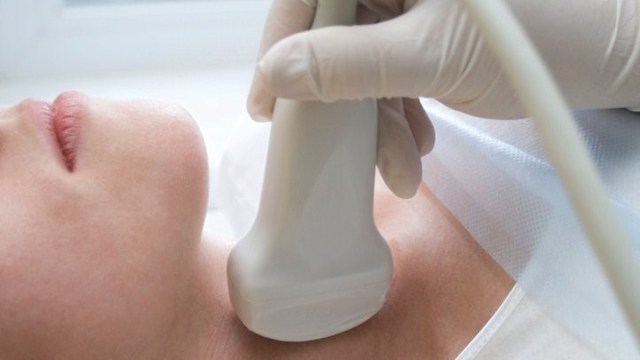Does swelling of the thyroid mean you are suffering from either hypo or hyper thyroidism? No. Having an enlarged thyroid does not necessarily mean that you have either one the conditions. An enlarged thyroid or goiter is the most common thyroid disorder affecting mostly women than men. A goiter can happen for several reasons, including genetics, suppression of the auto-immune system or extrinsic influences.
A goiter is that mass or enlarged portion of the lower part of a person's neck in the front. Most goiters that do not cause thyroid problems are called non-toxic goiters. In some cases they can be associated with hypo or hyper thyroidism. Patients with goiter or an enlarged thyroid gland often feel a pressure on their windpipe, and they may have difficulty in breathing because of the pressure or swallowing. Non-toxic goiter is the most common type that affects women during adolescence, menopause and pregnancy when increased hormones are required by the body but the demand for them is not met. There are two kinds of non-toxic goiters: endemic and sporadic. Endemic goiter is usually associated with iodine deficiency in the diet. Sporadic goiter is more random and is caused by higher levels of goitrogenic foods or certain drugs. When foods such as spinach, cabbage, soybeans, peas, peaches, radishes, strawberries or rutabagas and drugs such as iodides, cobalt, or lithium are consumed in higher quantities, a sporadic goiter may be formed.
Symptoms of a non-toxic or enlarged goiter are: raspy or noisy breath that comes as a result of pressure of the gland on the windpipe, respiratory distress, dysphagia or syncope. Treatments usually consist of diet changes, hormone replacements, radiation or surgery to remove the goiter. Sometimes it might take months or even years to cure enlarged thyroid.
Graves disease is a form of hyperthyroidism that is caused by abnormal antibodies that make the thyroid gland work hard to produce more thyroid hormone, making the gland enlarged. This is more common in teenage girls and young or middle aged women. Medications are given for one to two months, and if not cured a radioactive iodine (RAI) that comes in capsule form is given to permanently reduce the size of the enlarged gland. Surgery or thyroidectomy is the last resort for taking out the enlarged gland which results in hypothyroidism and medications that need to be taken for life.
Hashimoto's thyroiditis is an auto-immune disease that comes from hypo thyroidism. This normally attacks teenagers, and it causes the body's immune system to attack the thyroid cells in the glands to stop the function or production of the thyroid hormone. When this happens the gland is pressured to produce more hormone to keep up with the levels which in turn results in enlarged gland or goiter. This condition is diagnosed with blood tests and is treated with a lifetime hormone replacement therapy. Blood tests are done periodically to keep up with the levels and adjustments of the medication.
Thyroid nodules are lumps or enlarged areas in the thyroid gland, which usually is indicated by tenderness or pain in the throat and by tests. This may be due to the inflammation of the glandular tissue or a cystic nodule. It is mostly harmless and is treated with medication. If the swelling or pain persists a biopsy is indicated to determine the severity whether it is cystic or cancerous nodule and usually taken out at the same time.
Although enlargement of the thyroid gland does not always indicate the presence of the thyroid disease, it should be checked by the doctors in order to diagnose it properly and treatment should be given appropriately. Like any other conditions of the body proper diet, exercise , lifestyle changes and medications should be considered in order to live a healthy and happy life because, OUR LIFE MATTERS.






Add a CommentComments
There are no comments yet. Be the first one and get the conversation started!